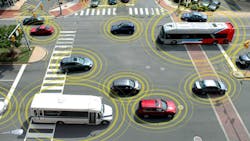WASHINGTON - It is the stuff of sci-fi movies, but vehicles traveling on U.S. roads will soon be able to "talk" to one another to avoid accidents.
U.S. regulators gave the green light Monday to the use of vehicle-to-vehicle communication technology that can exchange basic safety data such as speed and position to help avoid collisions.
"Vehicle-to-vehicle technology represents the next generation of auto-safety improvements, building on the life-saving achievements we've already seen with safety belts and air bags," said U.S. Transportation Secretary Anthony Foxx in announcing the approval.
"By helping drivers avoid crashes, this technology will play a key role in improving the way people get where they need to go while ensuring that the U.S. remains the leader in the global automotive industry."
Approval follows a test project begun in 2012 in which vehicles equipped with wireless devices were used to warn drivers about specific hazards such as an impending collision at a blind intersection, or a vehicle stopped ahead.
Officials said the technology can help avert rear-end, lane change, and intersection crashes. But the systems do not include technology such as automatic braking or steering.
The National Highway Traffic Safety Administration (NHTSA) said it is finalizing its analysis and will publish a report for public comment, with the goal of establishing rules for the new technology.
The agency said the systems would include "several layers of security and privacy protection" to ensure that vehicles can rely on messages sent from other vehicles for potential safety problems.
NHTSA acting administrator David Friedman said: "Decades from now, it's likely we'll look back at this time period as one in which the historical arc of transportation safety considerably changed for the better, similar to the introduction of standards for seat belts, airbags and electronic stability control technology."
Scott Belcher, of the Intelligent Transportation Society of America, a trade group representing transportation and technology industries, welcomed the announcement.
"While the auto industry has made great strides to reduce fatalities and injuries after a crash, the next giant leap is to enable real-time communication between vehicles and with the world around them so crashes can be avoided in the first place," Belcher said in a statement.
Copyright Agence France-Presse, 2014
About the Author
Agence France-Presse
Copyright Agence France-Presse, 2002-2025. AFP text, photos, graphics and logos shall not be reproduced, published, broadcast, rewritten for broadcast or publication or redistributed directly or indirectly in any medium. AFP shall not be held liable for any delays, inaccuracies, errors or omissions in any AFP content, or for any actions taken in consequence.
